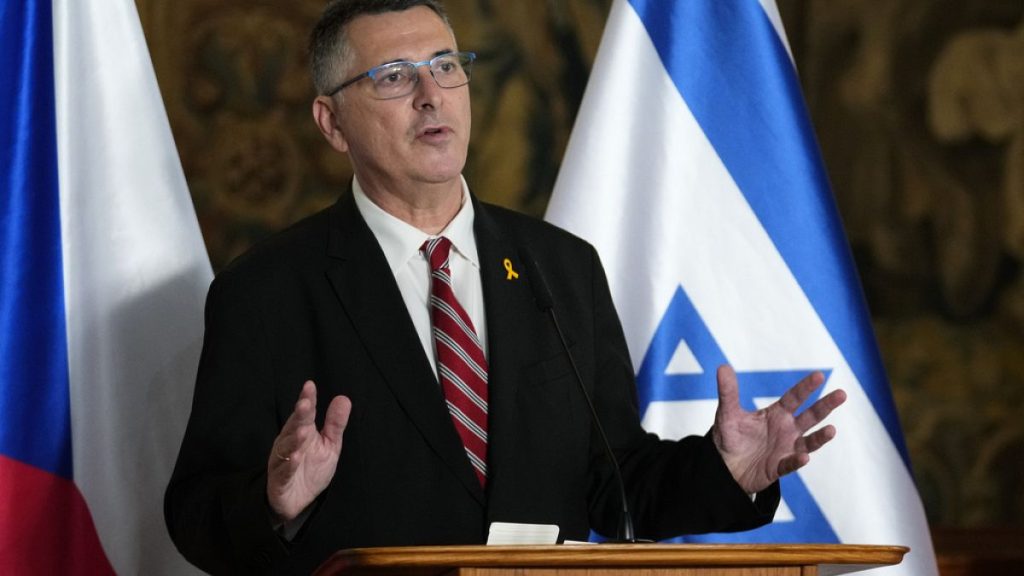The simmering tensions between Israel and Ireland escalated dramatically on Sunday with the announcement by Israeli Foreign Minister Gideon Sa’ar that Israel would be closing its embassy in Dublin. This decision, attributed by Sa’ar to the “extreme anti-Israel policies of the Irish Government,” marks a significant deterioration in the diplomatic relationship between the two nations. While the specific policies cited by Sa’ar remain undefined in his initial statement, the move comes amidst heightened international scrutiny of Israel’s actions in the ongoing Gaza conflict. The closure represents a forceful expression of Israel’s disapproval of Ireland’s stance, signaling a deep rift in their political perspectives and potentially jeopardizing future cooperation on various fronts.
Ireland swiftly responded to the announcement, expressing profound disappointment and vehemently rejecting the accusations of anti-Israel sentiment. Irish Prime Minister Simon Harris underscored Ireland’s commitment to peace, human rights, and international law, emphasizing the nation’s unwavering support for a two-state solution that would allow both Israel and Palestine to coexist peacefully and securely. Harris explicitly refuted the characterization of Ireland’s position as anti-Israel, framing it instead as a principled adherence to international norms and a commitment to protecting human rights. This stark contrast in interpretations underscores the fundamental disagreements at the heart of the diplomatic rupture.
The timing of the embassy closure is particularly noteworthy, coinciding with the ongoing conflict in Gaza. The escalating violence and resulting casualties have drawn widespread international condemnation, with many nations, including Ireland, expressing grave concerns over the humanitarian crisis unfolding in the region. Prime Minister Harris explicitly condemned the continuation of the war in Gaza and the loss of innocent lives, characterizing it as unacceptable, a violation of international law, and a form of collective punishment against the Palestinian people. This explicit criticism of Israel’s actions likely contributed to the escalating tensions that culminated in the embassy closure.
The closure of the Israeli embassy in Dublin represents a significant diplomatic breakdown, effectively severing a direct channel of communication and cooperation between the two countries. This action could have far-reaching consequences, potentially hindering future dialogue and collaboration on issues of mutual interest. The absence of a diplomatic presence may also complicate consular services for Israeli citizens in Ireland and Irish citizens in Israel, adding a practical dimension to the political fallout. Furthermore, the move could embolden other nations critical of Israel’s policies, potentially leading to a broader diplomatic isolation of Israel on the international stage.
While the immediate implications of the embassy closure remain to be seen, the underlying tensions between Israel and Ireland are deeply rooted in differing perspectives on the Israeli-Palestinian conflict. Ireland’s vocal criticism of Israel’s actions in Gaza, coupled with its support for Palestinian self-determination, has long been a source of friction between the two nations. Israel, on the other hand, views such criticism as biased and hostile, arguing that its actions are necessary for its security and self-defense. This fundamental divergence in perspectives has created a seemingly insurmountable obstacle to meaningful dialogue and reconciliation.
The future of the relationship between Israel and Ireland remains uncertain. The embassy closure signifies a significant escalation of tensions, making any immediate resumption of normal diplomatic relations unlikely. The path forward will require both sides to engage in constructive dialogue and find common ground on which to rebuild trust. However, given the deeply entrenched differences in their perspectives on the Israeli-Palestinian conflict, achieving a meaningful resolution will require significant diplomatic effort and a willingness from both sides to reconsider their entrenched positions. The international community will likely play a crucial role in facilitating dialogue and encouraging a de-escalation of tensions, but ultimately, the responsibility for restoring the relationship lies with Israel and Ireland.

